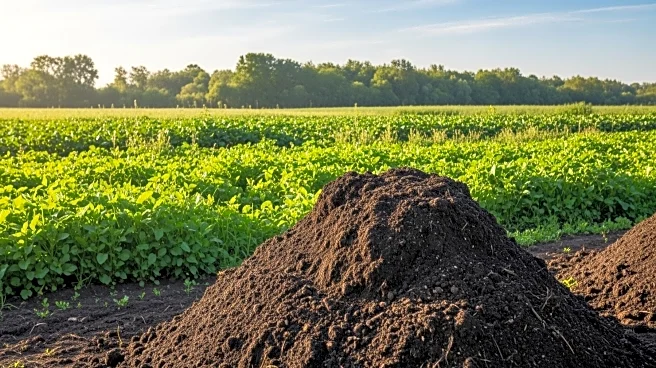What's Happening?
A study conducted by agronomists at Iowa State University (ISU) has revealed that the byproducts of anaerobic digestion, specifically digestate, can significantly enhance soil health. The research, which spanned 12 years, focused on a commercial-sized farm in Iowa and demonstrated that digestate can restore soil organic carbon and potentially reduce the need for synthetic nitrogen fertilizers. The study was conducted at Sievers Family Farms, where digestate has been applied to fields for several years. The findings indicate that digestate, a byproduct of anaerobic digestion of manure and corn stover, can increase soil organic carbon by an average of 714 pounds per acre annually, with fields showing a 9% increase in soil organic carbon over the study period. The research suggests that digestate could be marketed to other farmers as a cost-effective alternative to synthetic fertilizers.
Why It's Important?
The implications of this study are significant for the agricultural industry, particularly in terms of sustainable farming practices. By utilizing digestate, farmers can improve soil health, enhance crop yields, and reduce dependency on synthetic fertilizers, which are often costly and environmentally damaging. This approach not only supports the production of renewable natural gas but also offers a potential revenue stream for farmers who can sell digestate to others. The study underscores the importance of innovative agricultural practices that contribute to environmental sustainability and economic viability. Farmers with anaerobic digestion systems stand to benefit from improved soil health and potentially increased crop yields, while also contributing to the reduction of greenhouse gas emissions through the production of renewable energy.
What's Next?
The next steps in this research involve analyzing how digestate impacts yields and other soil nutrient metrics, particularly nitrogen levels. The research team has conducted nitrogen trials but has yet to analyze the data. Additionally, there is interest in studying the impact of digestate on water quality, which could further validate its benefits. As anaerobic digestion becomes more prevalent, farmers may increasingly adopt this technology to manage manure, produce renewable natural gas, and improve soil health. The potential for digestate to be tailored to specific nutrient needs of fields could lead to more targeted and efficient farming practices.
Beyond the Headlines
Anaerobic digestion represents a shift towards more sustainable agricultural practices, addressing both environmental and economic challenges. The ability to improve soil health while reducing reliance on synthetic fertilizers aligns with broader efforts to promote sustainable farming and reduce agricultural carbon footprints. This study highlights the potential for anaerobic digestion to play a crucial role in the future of farming, offering solutions to manage waste, produce renewable energy, and enhance soil health.










